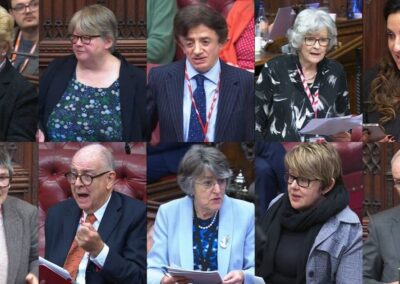The first day of Second Reading of the assisted suicide Bill in the House of Lords took place on Friday, 12 September, with 69%, almost 7 in 10, of Peers who took a position on the Bill speaking against it.
While Lord Falconer, the Bill’s sponsor in the Lords, attempted to assure Peers of the robustness of the Bill’s safeguards and the alleged role of the Lords in following the will of the Commons, the majority of Peers subjected the Bill to fierce criticism, with four separate Peers branding the Bill “not fit for purpose”.
While the Bill progressed from the House of Commons, where a majority of those who spoke did so in favour of the proposed legislation (25 spoke in favour, 21 spoke in opposition), the situation in the House of Lords is considerably different. After the debate, Lord Jackson of Peterborough said “This kind of opposition at Second Reading is a clear indication of the direction the Bill is heading. The strength of concern voiced today makes it increasingly unlikely that this Bill will pass at Third Reading, and momentum is clearly against it”.
“License to Kill Bill”
Lord Falconer sought to reassure Peers of the strength of the Bill by pointing to amendments that were accepted in the Commons. However, more than 300 amendments, including protections for people with anorexia, autism, learning disabilities, Down’s syndrome and diabetes, were rejected.
In an impassioned speech, the former Prime Minister, Theresa May, who now sits in the House of Lords, highlighted what is at stake when such protections are stripped away. “This is not an assisted dying Bill but an assisted suicide Bill. As a society, we believe that suicide is wrong”.
“Suicide is wrong”, she added, “but this Bill effectively says suicide is okay. What message does that give to our society? Suicide is not okay. Suicide is wrong. This Bill is wrong and […] it should not pass”.
Baroness May also warned that, without a coroner’s report, “there is a danger that this could be used as a cover-up for mistakes made in hospital or for a hospital-acquired infection which has led to an increased likelihood of death. I have a friend who calls it the ‘Licence to Kill Bill'”.
As with other Peers and MPs, Baroness May also expressed concern about the adequacy of safeguards, believing that they will not “prevent people being pressurised to end their lives”.
Baroness Goudie insisted on the importance of accurate language when discussing this Bill. “Why is this called by its supporters an assisted dying Bill? It is nothing of the sort. Assistance sounds good, and dying is a natural process which comes to us all. Pain relief and emotional support are vital and uncontroversial. However, this Bill is not about that; it is about assisted suicide, and that is altogether a different matter”.
Prognosis remains uncertain
Falconer insisted it was “right and possible” to create a safe assisted suicide law. Yet, Peers showed that the Bill’s most basic safeguard, the requirement of a six-month prognosis, is unworkable.
In particular, Lord Polak revealed that he was “given six months to live 37 years ago”.
“The debate is not about compassion: all of us want to alleviate suffering. It is about the means by which we do so. It is about the kind of society we want to be and the message we send when the law itself offers death as a solution”.
Baroness Falkner of Margravine raised similar concerns. “How do we define ‘terminal illness’, [or] measure ‘six months to live’ […]?”.
Lord Craig of Radley added that “We do not control the time of the first breath in our life. Society places special value on the right to live. Since the abolition of the death penalty, should it be approved by law to time one’s last living breath?”.
Crossing the Rubicon
Lord Falconer also assured Peers that, if the assisted suicide Bill were to pass, in ten years’ time, assisted suicides would account for less than 1% of total deaths.
Yet the experience in Canada tells a very different story. Just nine years after legalisation, 4.7% of all deaths are now by assisted suicide. “Eight years on, assisted dying has become routine and is now the fifth leading cause of death”, as Baroness Meyer reminded.
“Reports show that people are seeking euthanasia not because they are terminally ill, but because they are poor, isolated or unable to access proper care”.
Lord Herbert argued, along with several other Peers, that the Bill would be an instance of “crossing the Rubicon”, whereby the state would facilitate suicide rather than prevent it.
“We are told that the purpose of the Bill is to prevent terrible suffering, but there is nothing in the Bill that says this. The essential condition is that someone must be terminally ill, not that they are suffering”.
Palliative care
Lord Stevens of Birmingham noted that the reports on palliative care required by the assisted suicide Bill will be worthless. “[W]e have in the Bill two reports on offer” he said, “one a year after the Bill is passed—if it is—and another, in effect, in nine years’ time”.
“Frankly, those reports on the state of palliative care are not going to be worth the paper they are written on. It would be the Secretary of State at the time marking their own homework”.
Lord Stevens also said that “you cannot have meaningful choice without having palliative care as part of that choice”.
Baroness O’Loan quoted Dame Cicely Saunders, saying “You don’t have to kill the patient in order to kill the pain”. She closed her contribution saying “This Bill is ill-conceived, uncertain and unsafe. It should be rejected”.
Insufficient safeguards for the most vulnerable
Falconer absurdly claimed that people with disabilities want the same assisted suicide rights as everyone else, while no major disability organisation supports this Bill, and over 350 disability groups oppose it.
Baroness Monckton expressed her concerns about the effect of the Bill on people with disabilities. In particular, she raised concerns about people with Down’s syndrome, like her daughter, who are “highly suggestible” and “anxious to please”.
In March this year, the assisted suicide Bill Committee voted down an amendment to safeguard people with Down’s syndrome.
Later on, Baroness Prentis revealed that she was recently diagnosed with cancer, and how aware she was of suffering and feeling like a burden. She called for Peers to keep vulnerable people who cannot access the same support as her in their thoughts during the assisted suicide debate.
Finally, Lord Falconer rejected another safeguard that would make a psychiatric assessment compulsory for anyone who wishes to have an assisted suicide.
Time is short
Lord Falconer said that, after conversations with the Government, there would be “more than enough time” for scrutiny. Yet they still seem to be rushing a life-and-death Bill through Parliament and being given special help to do so.
Lord Forsyth was highly critical of the short time available to consider this Bill, saying “As I understand it, four days have been allocated between now and Christmas to consider the Bill – the Employment Rights Bill has a total of 15 days. These are Fridays, and there are other Private Members’ Bills. It is really important that this matter be discussed properly, and that is why I have tabled this amendment. Anyone who has read the report from the committees of this House will realise that there is much to do on amending the Bill”.
Death panels a poor replacement for a High Court judge
Lord Falconer claimed that replacing the safeguard of a High Court judge with new panels represented a “better safeguard”.
However, Lord Murray of Blidworth said the panels meant to oversee each request for assisted suicide were “toothless”. They have “no power to require evidence to protect vulnerable people, no power to summon witnesses or experts, no power to order the disclosure of documents and no powers of compulsion at all”.
On this matter, even the Royal College of Psychiatrists has raised serious concerns over the role of psychiatrists on the panels.
Spokesperson for Right To Life UK, Catherine Robinson, said “The large majority of Peers speaking in opposition to the Bill at Second Reading suggests the House of Lords is currently significantly more opposed than supportive of the Bill. Given that the House of Lords can reject the Bill, the Bill is increasingly looking like it will never become law”.
“Vulnerable people in our society need our unwavering protection and the best quality care, not a pathway to assisted suicide. Evidence from abroad shows that, if this legislation becomes law, large numbers of vulnerable people nearing the end of life would be pressured or coerced into ending their lives”.












